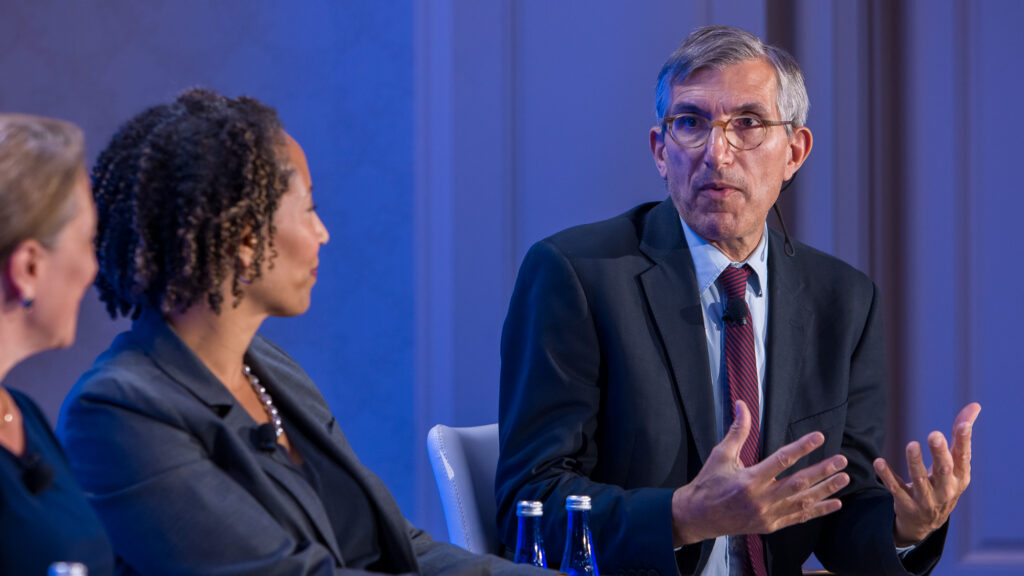WASHINGTON — Peter Marks wants to keep his job.
A top Food and Drug Administration official, Marks arrived Wednesday at the five-star hotel where the Milken Institute was hosting its Future of Health Summit via bicycle, having flown back to D.C. from Boston, where he spoke earlier in the day. In a black suit jacket and moccasins, he looked slightly nervous on a six-person panel. The topic of the session was supposed to be “next-gen biomedical research.”
advertisement
But from his first comments on stage, Marks seemed eager to talk about something else: the long-established safety and efficacy of vaccines, an issue he had also brought up earlier in the day in Boston. Vaccines may take center stage if President-elect Donald Trump fulfills his promise to give Robert F. Kennedy, Jr., a former presidential candidate with a long history of challenging the safety and efficacy of routine childhood vaccinations, a mandate to shape health care policies.
Marks sped through an argument about gene therapies facing “a crisis of cost” but also said they could become “an order of magnitude” less expensive. Without being asked, he brought up the significant benefits and low costs of vaccines, and said that if the FDA had to “re-litigate” vaccine safety and efficacy, it would slow down its ability to approve other kinds of new treatments.
“There’s about as much evidence that vaccines work and that they’re reasonably safe as there is evidence that there’s gravity in this room,” Marks said. “I’m not gonna float out of here, even if I might want to.”
Then he referenced comments Kennedy has made about his desire to see all the data on vaccines.
“If we end up in a place where we have to revisit the safety of vaccines, we’re happy to do so,” Marks said. “There are no secrets there. There’s no secret files at FDA. There are good trials that have been done. There’s supportive data. Nobody has said that vaccines are perfectly safe. Vaccines have a benefit-to-risk [ratio] that’s highly favorable, and we’re happy to discuss that, and that’s where we may go.”
advertisement
The comments were even more striking because earlier that morning, in Boston, Marks had said that the data around vaccines are “black and white.”
Under persistent questioning from STAT Executive Editor Rick Berke, Marks returned to the topic of RFK Jr.’s potential influence on the FDA again and again, emphasizing that the agency is an organization of public servants.
“What we’d ask is that someone keep an open mind to the fact that vaccines might actually work and might not be dangerous,” Marks said. “Look, we at FDA are trying to lean in as much as we can. We have a group of devoted public servants. I think we can be asked to respond to a lot of different incoming that are not our typical incoming. The only thing I would ask from anyone is to just do it with respect.”
The FDA employs 20,000 people, Marks noted, 1,500 alone in his center, which reviews biologic products, another 6,000 in the FDA center that evaluates traditional drugs. These people, he said, “are so devoted to what they do, and they do what they do to protect the American people, not because they’re trying to, you know, not for any kind of nefarious purpose.”
During the Covid pandemic, he said, FDA employees worked 14 hours a day to speed the path of the Covid vaccines to market.
On some level, Marks said, some parts of his job are the same in any administration. He noted that the H5N1 bird flu virus is replicating in many species in the U.S., including cows, which provide a big reservoir for the virus. “It’s just a matter of time before we see more break out and potentially either something that could be epidemic or pandemic potential, whether it is this year, next year, or the year after,” Marks said.
The challenges, he said, are not that different from those his center faced during the pandemic.
“We managed to get by by keeping our eye on public health and drowning out a lot of the noise,” Marks said. “So that’s what we’ll have to do here.”
If there were another epidemic, Marks said, “it would be really nice not to lose lives unnecessarily, like we did during Covid-19 from people who didn’t take vaccines” because they had false impressions about the vaccines’ safety or efficacy.
advertisement
“I sat in the room with Mr. Kennedy before on the issues of vaccines multiple times,” Marks said. He said he thinks that there is a great opportunity for the FDA to embrace Kennedy’s efforts against chronic disease. “You don’t need GLP-1 inhibitors if you don’t have weight problems to start with because you have a good diet and exercise,” Marks said. “We’re happy to show as much of the data as we can, and I think the data are essentially overwhelming in certain areas. We’ll just have to engage in that dialogue.”
Marks said that he believes all the vaccines licensed in the U.S. are safe and effective.
Berke asked Marks for an assessment of Kennedy’s “command of science.” Marks replied that even among MDs and Ph.D.’s, a person’s ability to drill down into scientific data can vary.
“I think he has an understanding of science that, perhaps, it’s not as deep as others might. But I think what I would just ask him, more than anything else… I know a number of attorneys who know more than most Ph.D.s and MDs about medicine. So it’s not the degree. It’s just a matter of keeping an open mind.”
Berke asked, given all this, whether Marks even really wants to keep his job.
“Look, the people who I work with absolutely are committed to what we do in terms of protecting the health of Americans,” Marks said. The room erupted in applause.
“I do want to keep my job.”

